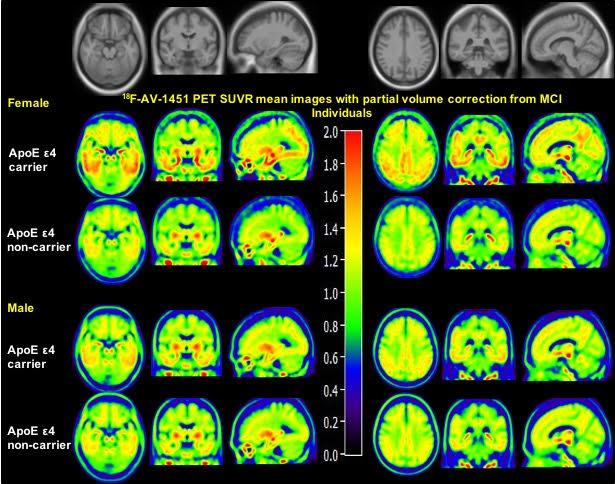PET imaging shows women with the ApoE 4 allele are more susceptible than men to tau accumulation in the brain

Credit: Paranjpe M, Liu M, Paranjpe I, et al.
The strongest genetic risk factor for Alzheimer’s disease is the apolipoprotein E type 4 allele (ApoE ε4). Research presented by Manish Paranjpe at the 2019 Annual Meeting of the Society of Nuclear Medicine and Molecular Imaging (SNMMI) used positron emission tomography (PET) to show that women who are ApoE ε4 carriers and already experiencing mild cognitive impairment are more susceptible than men to tau accumulation in the brain.
“Sex plays an important role in Alzheimer’s disease risk, with females having a higher lifetime risk of developing the disease and an increased vulnerability to genetic risk factors,” points out Yun Zhou, who led the project at the Mallinckrodt Institute of Radiology, Washington University in St. Louis School of Medicine. He explains, “This is the first study to demonstrate that sex modulates the effect of ApoE ε4 on brain tau depositing, measured using 18F-AV-1451-PET imaging, in the entorhinal cortex, amygdala, parahippocampal gyrus, and posterior cingulate of the brains of patients with mild cognitive impairment (MCI). Strikingly, females experience greater ApoE ε4-associated increases in brain tau deposition in these regions compared to their male counterparts.”
This cross-sectional study involved 131 cognitively normal (CN) elderly controls (66 women) and 97 MCI subjects (39 women) from the Alzheimer’s Disease Neuroimaging Initiative (ADNI) database. The mean age of all was 77. Preprocessed 18F-AV-1451 PET images, T1-weighted structural MRI scans and demographic information were included. After downloading pre-processed images from ADNI, a partial volume correction method was applied on all PET images (improving spatial resolution and contrast), and structural MRIs were used for PET spatial normalization. All statistical analyses were performed after controlling for baseline age and education.
In addition to finding women with the ApoE ε4 mutation more susceptible than men to tau accumulation, Zhou notes: “Our study also confirmed that sex does not modulate the ApoE ε4-associated tau deposition in the brains of cognitively normal elderly individuals, and it extends our understanding of how sex modulates the ApoE ε4 effect on tau deposition in the brains of individuals at the early stage of Alzheimer’s disease.”
Paranjpe adds, “Our results have implications for clinical trials, biomarkers, and therapeutic development in Alzheimer’s. In designing clinical trials aimed at an MCI cohort, potentially our study suggests that the dosage of anti-tau antibodies should be modified by ApoE ε4-sex group. Moreover, we hope that insights from our work will shed light on potential treatments for Alzheimer’s disease, including sex-specific tau-targeted and ApoE-targeted drug development.”
###
Abstract 253: “Sex Modulates the ApoE ε4 Effect on Tau 18F-AV-1451 PET Imaging in Individuals with Normal Aging and Mild Cognitive Impairment,” Manish Paranjpe, University of California, San Francisco; Min Liu, Johns Hopkins Medicine, Baltimore, MD; Ishan Paranjpe, Icahn School of Medicine at Mount Sinai, New York, NY; Rongfu Wang, Peking University First Hospital, Beijing, China; and Tammie Benzinger and Yun Zhou, Mallinckrodt Institute of Radiology, Washington University, St. Louis, MO.
To schedule an interview with the researchers, please contact David Harrison at (410) 804-1728 or [email protected]. All 2019 SNMMI Annual Meeting abstracts can be found online at http://jnm.
About the Society of Nuclear Medicine and Molecular Imaging
The Society of Nuclear Medicine and Molecular Imaging (SNMMI) is an international scientific and medical organization dedicated to advancing nuclear medicine and molecular imaging, vital elements of precision medicine that allow diagnosis and treatment to be tailored to individual patients in order to achieve the best possible outcomes.
SNMMI’s more than 16,000 members set the standard for molecular imaging and nuclear medicine practice by creating guidelines, sharing information through journals and meetings and leading advocacy on key issues that affect molecular imaging and therapy research and practice. For more information, visit http://www.
Media Contact
David Harrison
[email protected]




